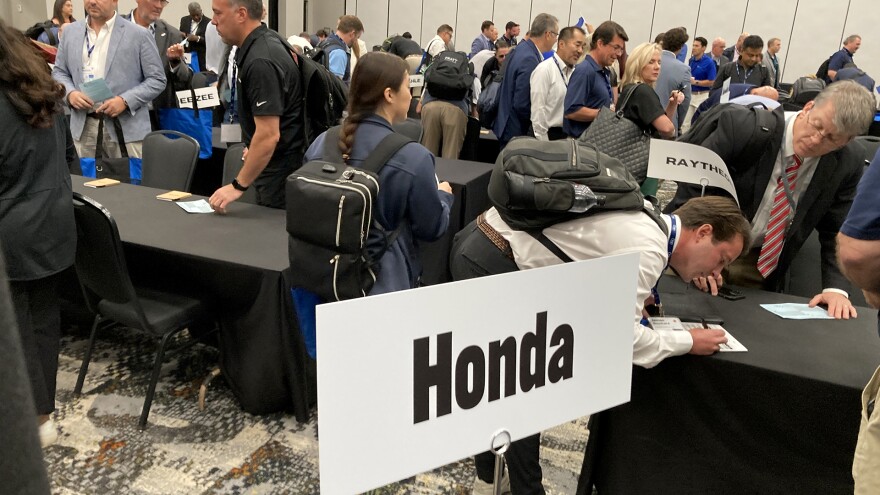The ballrooms in the Von Braun Center in Huntsville, Alabama, aren’t exactly romantic. Think fluorescent lights, gray conference room dividers and loud, with more than 180 salespeople making their pitches.
But for 13 years, the Southern Automotive Conference has held this matchmaking event to help kindle sparks between manufacturers and suppliers in the South’s booming auto industry with a speed dating spin.
U.S. companies get the full attention of household names like Hyundai and Mazda to pitch them on a partnership — at least until the buzzer signals them to move on to the next “date.” It’s three hours of handshakes, business card swaps and industry jargon you’d expect at a conference networking night, packed into five-minute chunks.
“The traditional trade show model, you spend a lot of time talking to the wrong people,” Jack Grace, director of sales at Landrum Workforce Solutions, said. “Having this environment where it’s very distilled, albeit a little chaotic, is really interesting.”
Here are three takeaways from the matchmaking, car-building scene.
Tariffs have carmakers looking at American companies with open eyes

Foreign car makers, like Mercedes-Benz from Germany and Honda from Japan, dominate the American South’s auto industry. Alabama alone has four major assembly plants, and the auto sector employs about 54,000 Alabamians.
And more jobs could come due to President Donald Trump’s 25% tariffs on cars and auto parts, along with even higher tariffs on some materials, which have carmakers reconsidering their supply chains.
“I have a ton of customers that are moving tools back from overseas,” Courtney Bowling, an account manager with Stratosphere Quality, said while waiting to sign up for a meeting with Volkswagen. “It’s more jobs for American workers, and I love that.”
Of course, it’s also American companies feeling the financial pain. Baxter Enterprises, a Tennessee supplier of tools and finished parts for companies like Mercedes and BMW, has seen prices go up on the materials it imports from overseas. Some metal clips and components have gone up 50%, which is why Baxter had a table at the event to find U.S. suppliers.
The Mazda-Toyota factory in Alabama also had a spot to check out the local supply scene.
“We’re looking for ways that we can save money with tariffs being what they are,” Marlena Mellenthin, a procurement specialist at the plant, said. “We’re just open to whatever is out there.”
Companies aren’t rushing supply chain changes yet

While Mellenthin said Mazda-Toyota is open to finding better services and pricing, the plant already has sources for most of what it needs to continue operations, even with the new tariffs.
Ultimately, becoming the newest link on a car maker’s long, complex and well-established supply chain isn’t easy, even with the tariff incentive. The point of participating in the manufacturing speed dating rounds is to quicken this still long courtship, according to the matchmaking event’s founder, Jean Marie Thrower.
“It takes years to get your parts on a car,” Thrower, who’s also president of Supplier Development Systems, said.
Companies are also finding ways to manage tariffs without shifting fully to U.S. suppliers. During a panel at the conference, the head of Honda’s Alabama plant, Lamar Whitaker, said the company is not making drastic changes by relocating manufacturing stateside. Plus, the company already has a robust supply chain in the country.
Instead, Honda’s moving production around in its North American factories. The ones in the U.S. are now more about building cars for the American consumer, rather than exporting to sell elsewhere. That role moved to the company’s Canadian factory.
A handshake and personality still matter for making a sale

Saving money, primarily by avoiding tariffs, might have been the main motivation for buyers at the event, but they were not just looking for the lowest bidder.
At least not Doug Drake, the materials manager at Baxter Enterprises, who manned the company table. He could have met many of these suppliers through a Google search and a video call, but he wanted to be able to shake hands and meet face-to-face.
To him, personality matters in the manufacturing world, and some attitudes he doesn’t get along with.
“They can be a real pushy salesperson,” Drake said. “Most of the time I don’t care for that.”
For the salespeople, they’re here to avoid wasting time hunting a conference floor just to find a company rep without any purchasing power. Grace, of Landrum Workforce Solutions, said that while the match-making is nerve-racking, the five minutes of face time is worth it.
“This is gold as far as I’m concerned,” Grace said.
This story was produced by the Gulf States Newsroom, a collaboration between Mississippi Public Broadcasting, WBHM in Alabama, WWNO and WRKF in Louisiana and NPR.









